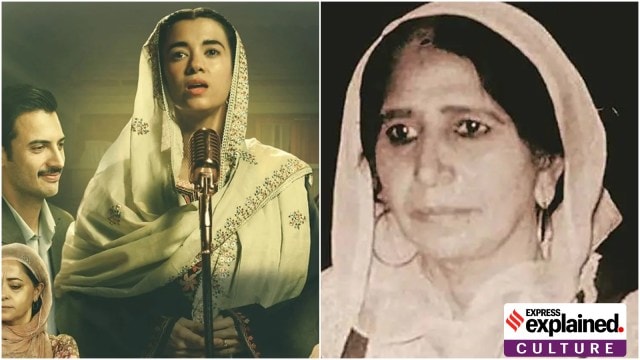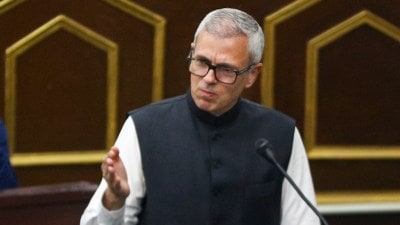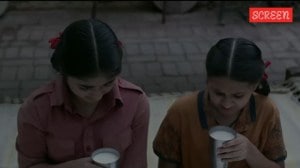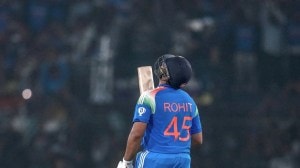Songs of Paradise: How Raj Begum became Radio Kashmir’s first woman singer, and its much-needed soul
While Songs of Paradise is a dramatised account, here’s the real story of Raj Begum, the nightingale of Kashmir, who sang through Kashmir’s political crosswinds.
 Songs of Paradise, streaming on Amazon Prime, is loosely based on the life of Raj Begum. (YouTube)
Songs of Paradise, streaming on Amazon Prime, is loosely based on the life of Raj Begum. (YouTube)When Kashmiri singer Raj Begum passed away in 2016, she had multiple national awards and widespread acclaim to her name. This was very different from the beginning of her career, when she had faced stiff opposition and condemnation.
A new movie called Songs of Paradise, starring Saba Azaad and Soni Razdaan and streaming on Amazon Prime, is loosely based on the life of Raj Begum, also called the Nightingale of Kashmir. The film has been directed by Danish Renzu of Half Widow (2018) fame.
Raj Begum was the first woman singer to perform on Radio Kashmir (now All India Radio, Srinagar). Few artists from Jammu and Kashmir have bridged divides the way Raj Begum did, her songs flowing as a common thread through all the communities that have called the Valley home.
Raj Begum: Early life and discovery of her voice
Born in 1927 in Magarmal Bagh in Srinagar as Rehti, and raised in a poor and conservative family, Raj Begum was married very early to a businessman named Mohommad Abdullah. She never went to school, could not read or write, and had no training in music. But she would often sing at weddings across communities to help her family.
Her voice was heard one day by Ghulam Qadir Langoo, a Radio Kashmir staff artiste, singer and sarangi player who was once a court musician for Maharaja Hari Singh. In 1950, Langoo had been tasked with looking for women singers for the newly established radio station, and was walking the streets on this quest.
He chose to walk around the relatively impoverished area as singing and the performing arts were considered the vocation of “the lower classes, like my family,” Langoo once said in an interview with Kashmir Life.
For the conservative Kashmiri society of the time, singing outside of one’s home, especially for women, was not considered respectable. It took a while for Langoo to convince Rehti’s father and husband to let her sing. He also offered her daughter’s name to be used instead of hers, so that no one knew who was singing on the radio. It was Langoo who trained her in melody and diction.
“Scared, clandestinely, we went to the radio station. People despised us, saying we were shameless. They believed their daughters would follow us and bring them shame…we fought the taboos. We (she and Naseem Akhtar, who joined after her) stayed firm and pursued,” Raj Begum says in the NFDC documentary Raj Begum: The Melody Queen of Kashmir.
Kashmiri singer and composer Waheed Jeelani, in a conversation with The Indian Express, calls her decision to sing “pathbreaking”. “It was quite courageous of her. She faced social boycott and yet continued to sing. It was not just that it was a woman’s voice, it was a blazing and passionate voice that reached us and Kashmir listened intently,” he says.
Impact of Raj Begum’s voice on Kashmir
When Raj Begum walked inside the broadcasting station and sang Gulrez (Scattered Flowers), a love story translated from Persian by eminent Kashmiri poet Maqbool Shah Kralawari, her soulful rendition struck a chord.
The longing in Dil chooran hai, dil nivum shaman (The one who stole my heart in the cover of darkness), the sense of loss in Rum gayem sheehshass (My mirror split), lingered in the hearts of Kashmiris.
One of her most famous pieces was Mashravthas janan (My love, you’ve forgotten me), a poem by Kashmiri poet Rasa Javidani. It was the lament of a father whose son was lost to Pakistan during Partition, and still resonates in the collective memory of many Kashmiris.
“Raj Begum thawed the long-frozen cultural heritage of Kashmir. Our cultural ethos had become dormant… Raj Begum’s voice awakened it,” says poet and novelist Ghulam Nabi Gauhar in the NFDC documentary.
From criticism to earning respect, Raj Begum’s journey paved the way for a slew of female singers who came after her, including Naseem Akhtar, Shamima Dev Azad, Asha Kaul and Neerja Pandit.
Even as political unrest escalated in the 70s and 80s, Raj Begum’s regular radio broadcast, her dignified voice on the radio, was sometimes the only routine that survived. She retired in 1986.
Raj Begum’s music in the context of Kashmir’s politics
Songs of Paradise does not give any glimpse of Kashmir’s atmosphere and politics of the times it sets the story in. But music can hardly escape its context. In 1954, when Raj Begum began singing, the accession of Kashmir was still recent. Sheikh Abdullah had been imprisoned after a violent coup in 1953 and there was a lot of local unease after his deputy, Bakhshi Ghulam Mohommad, took over.
Raj Begum was later married to Qadir Ganderbali, who retired as DIG, Kashmir Police. According to Aijaz Ashraf Wani’s What Happened to Governance in Kashmir?, Ganderbali, after Abdullah’s arrest in 1953, led a specialised police unit under Ghulam Mohommad. He writes in his book, “Ganderbali unleashed a reign of terror, especially against anti-India elements. In police custody, he used such brutal methods as were not permissible under any law. No wonder then that Qadir Ganderbali became synonymous with zulum (oppression) in Kashmir”.
Awards and death
Raj Begum was given the Jammu And Kashmir State Excellence In Folk Music in 2008, some years after she won the Padma Shri in 2002. She was awarded the Sangeet Natak Akademi Award in 2013, three years before she passed away in 2016 at her daughter’s house in Chanapora. She was 88.



- 01
- 02
- 03
- 04
- 05



































